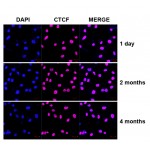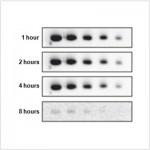| Reactivity: | Human, Mouse, Rat |
| Applications: | WB, IHC, IF/IC, ELISA |
| Host Species: | Rabbit |
| Isotype: | IgG |
| Clonality: | Monoclonal antibody |
| Gene Name: | glutamate ionotropic receptor AMPA type subunit 2 |
| Gene Symbol: | GRIA2 |
| Synonyms: | GLUR2; GLURB; GluA2; HBGR2; NEDLIB; gluR-2; gluR-B; GluR-K2; GluR2/GRIA2 |
| Gene ID: | 2891 |
| UniProt ID: | P42262 |
| Clone ID: | 9R1X2 |
| Immunogen: | A synthetic peptide corresponding to a sequence within amino acids 150-250 of human GluR2/GRIA2 (P42262). |
| Dilution: | WB 1:1000-1:6000; IHC 1:100-1:800; IF/IC 1:100-1:1000 |
| Purification Method: | Affinity purification |
| Concentration: | 1.2 mg/mL |
| Buffer: | PBS with 0.02% sodium azide, 0.05% BSA, 50% glycerol, pH7.3. |
| Storage: | Store at -20°C. Avoid freeze / thaw cycles. |
| Documents: | Manual-GRIA2 antibody |
Background
Glutamate receptors are the predominant excitatory neurotransmitter receptors in the mammalian brain and are activated in a variety of normal neurophysiologic processes. This gene product belongs to a family of glutamate receptors that are sensitive to alpha-amino-3-hydroxy-5-methyl-4-isoxazole propionate (AMPA), and function as ligand-activated cation channels. These channels are assembled from 4 related subunits, GRIA1-4. The subunit encoded by this gene (GRIA2) is subject to RNA editing (CAG->CGG; Q->R) within the second transmembrane domain, which is thought to render the channel impermeable to Ca(2+). Human and animal studies suggest that pre-mRNA editing is essential for brain function, and defective GRIA2 RNA editing at the Q/R site may be relevant to amyotrophic lateral sclerosis (ALS) etiology. Alternative splicing, resulting in transcript variants encoding different isoforms, (including the flip and flop isoforms that vary in their signal transduction properties), has been noted for this gene.
Images
 | Western blot analysis of various lysates using GluR2/GRIA2 Rabbit mAb (A11316) at 1:1000 dilution. Secondary antibody: HRP-conjugated Goat anti-Rabbit IgG (H+L) (AS014) at 1:10000 dilution. Lysates/proteins: 25μg per lane. Blocking buffer: 3% nonfat dry milk in TBST. Detection: ECL Basic Kit (RM00020). Exposure time: 1s. |
 | Immunohistochemistry analysis of paraffin-embedded Rat brain tissue using GluR2/GRIA2 Rabbit mAb (A11316) at dilution of 1:100 (40x lens). Microwave antigen retrieval performed with 0.01M PBS Buffer (pH 7.2) prior to IHC staining. |
 | Immunohistochemistry analysis of paraffin-embedded Mouse brain tissue using GluR2/GRIA2 Rabbit mAb (A11316) at dilution of 1:100 (40x lens). Microwave antigen retrieval performed with 0.01M PBS Buffer (pH 7.2) prior to IHC staining. |
 | Confocal imaging of paraffin-embedded Rat brain tissue using GluR2/GRIA2 Rabbit mAb (A11316, dilution 1:200) followed by a further incubation with Cy3 Goat Anti-Rabbit IgG (H+L) (AS007, dilution 1:500) (Red). DAPI was used for nuclear staining (Blue). Objective: 40x. Perform microwave antigen retrieval with 0.01 M citrate buffer (pH 6.0) prior to IF staining. |
 | Confocal imaging of paraffin-embedded Mouse brain tissue using GluR2/GRIA2 Rabbit mAb (A11316, dilution 1:100) followed by a further incubation with Cy3 Goat Anti-Rabbit IgG (H+L) (AS007, dilution 1:500) (Red). DAPI was used for nuclear staining (Blue). Objective: 40x. Perform microwave antigen retrieval with 0.01 M citrate buffer (pH 6.0) prior to IF staining. |
You may also be interested in:


